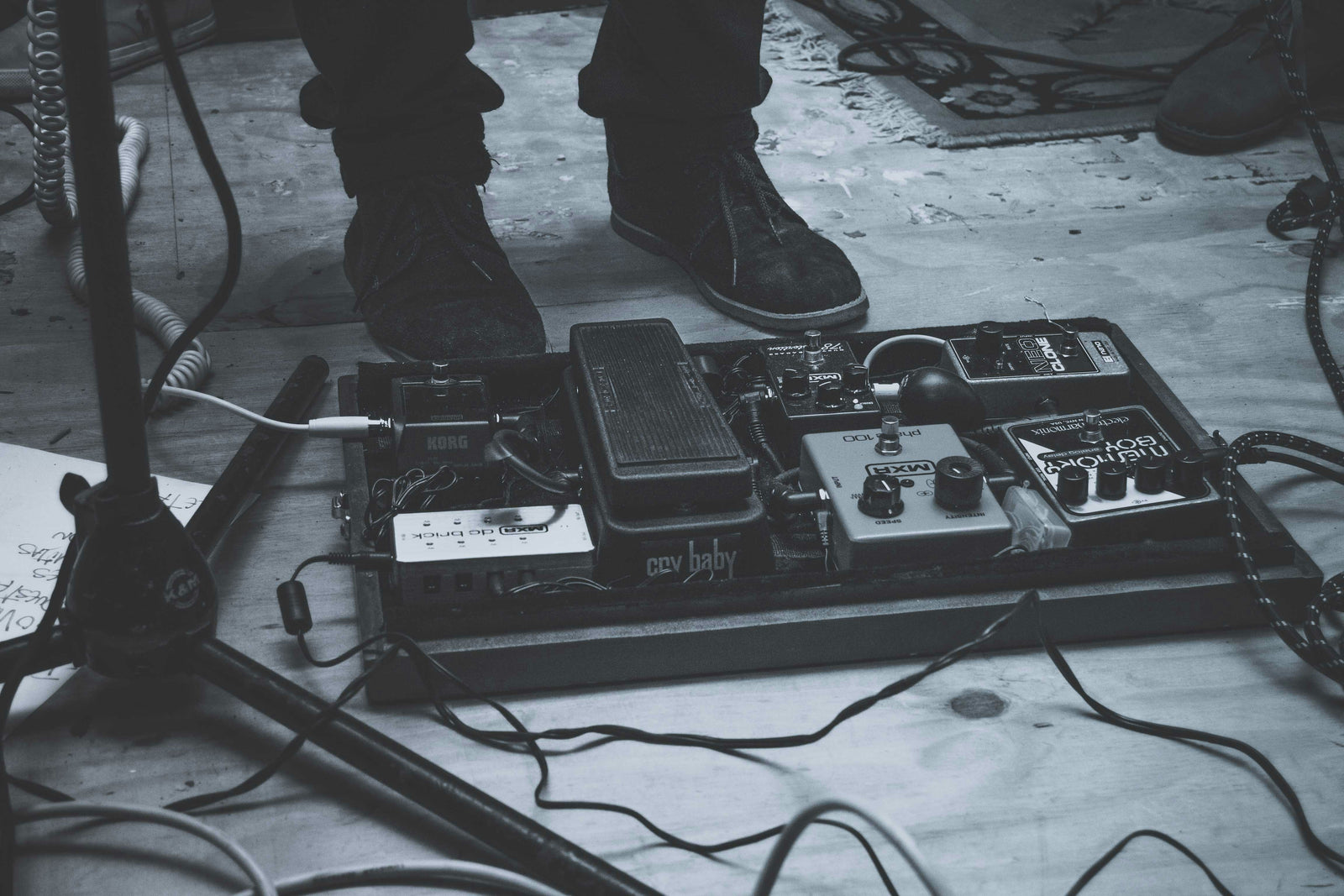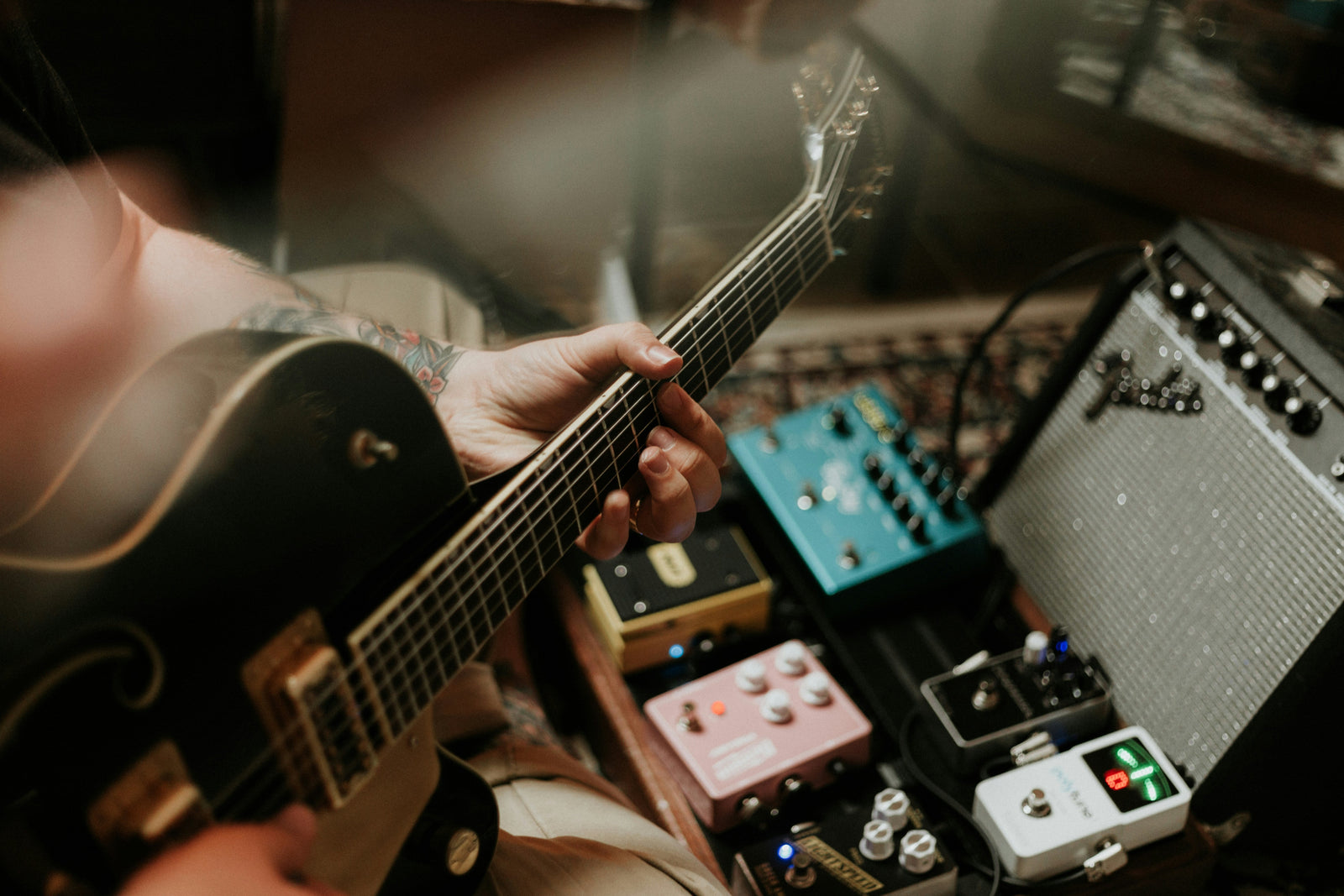Guitar Tuner Pedal Overview
Every guitarist knows the importance of a reliabletuner pedal. It's not a basic necessity; it's the cornerstone of every performance. With the options available, choosing the right tuner pedal can be overwhelming.
In this article, we'll delve into the world of guitar tuner pedals. Exploring their functionality, advantages, and different types available. Whether you're a seasoned professional or a beginner guitarist.
Understanding the nuances of tuner pedals is crucial for achieving impeccable tuning accuracy.
What is a Guitar Tuner Pedal and How Does it Work?
A guitar tuner pedal is a device that helps guitarists tune their instruments. This type of pedal shows the pitch of the strings and helps guide the tuning. Guitar tuner pedals are popular among musicians for their precision.
These pedals detect the guitar's pitch through a direct electrical connection. This connection ensures accurate pitch detection without background noise interference. Once connected, the pedal displays the current pitch of each string. The display usually shows if the pitch is too high, too low, or right.
The working mechanism of tuner pedals involves signal processing. When you play a string, the pedal processes the guitar's signal. It then converts the frequency of the string into a readable pitch format. Most tuner pedals use LED lights or an LCD screen for this display.
Guitar tuner pedals come with a footswitch. This switch activates or bypasses the tuner. When activated, the tuner mutes the output signal, allowing for silent tuning.
Some advanced models offer different tuning modes. These modes include standard, drop tunings, and open tunings. This versatility makes them suitable for various musical styles.
The Advantages of Using a Pedal Tuner Over Other Types of Tuners
Pedal tuners offer several advantages over other types of tuners.
Comparison with Clip-on Tuners:
Pedal tuners are more accurate than clip-on tuners. They connect to your instrument, minimizing interference. Unlike clip-ons, pedal tuners are not affected by ambient noise.
Clip-on tuners attach to the headstock and pick up vibrations. This can lead to inaccuracies if the environment is loud.
Comparison with App Tuners:
Pedal tuners provide more stability than app tuners. Apps can drain your phone's battery quickly. They also need your phone to be close, which isn't always practical. Pedal tuners are always ready on your pedalboard, a foot tap away.
In contrast, app tuners may suffer from microphone quality and background noise issues.
Exploring Types and Models of Guitar Tuner Pedals
Guitar tuner pedals come in various types. These tools assist guitarists in tuning their instruments with accuracy.
Types of Tuner Pedals: Chromatic vs. Polyphonic
Chromatic tuners are versatile and able to tune to any note across all pitches. They are ideal for musicians who use non-standard tunings.
Polyphonic tuners, meanwhile, enable musicians to tune all strings at the same time. This is very useful during live performances for quick checks and adjustments.
Popular Models for Various Skill Levels
For beginners, tuner pedals that are simple and easy to use are preferable. These models usually have fewer features but are more affordable. They are straightforward enough not to overwhelm novice users. Intermediate players might opt for tuners with extra features. These include many tuning modes or enhanced displays.
Professionals often seek out the most robust models. These models offer features like preset tunings and pitch calibration. They also include true bypass wiring to preserve the guitar’s tone when the tuner is inactive.
Guitarists must select a model based on their specific needs. Brands like BOSS, KORG, and VOX lead the market. They provide reliable and feature-rich tuners. These tuners cater to all levels of skill and performance demands.
Key Features to Consider When Choosing a Guitar Tuner Pedal
When picking a guitar tuner pedal, key features ensure optimal performance and convenience. These features help ensure accurate tuning and ease of use.
Must-Have Features for Effective Tuning
- Accuracy is paramount; look for tuners that offer precision within ±1 cents.
- A bright,easy-to-read display is crucial, especially on dimly lit stages.
- Ensure the pedal has afast tracking speed to recognize notes.
- Durability is crucial; metal casings withstand frequent use and transport better than plastic.
Extra Features: Metronomes and Sound Muting
Some tuner pedals come with built-in metronomes, which are useful for practice sessions. The ability to mute sound is vital for tuning between songs during a live performance.
This feature allows discreet tuning without audience interference.
True Bypass vs. Buffered Bypass
True bypass pedals let your signal pass through without alteration when the tuner is off. This keeps your tone pure. Yet, buffered bypass can be beneficial as it prevents signal loss in long cable runs. Consider your setup and if tone preservation or signal strength is more critical.
Consider pedals that offer visual feedback for flat, sharp, or in-tune states. An intuitive interface is helpful; it should not complicate the tuning process. Pedals that support various tuning modes (standard, drop D, open tunings) provide versatility.
Look for tuners that power up fast and have a stable power connection. Some models offer battery and DC adapter options, which adds convenience.
Tips and Best Practices for Using a Guitar Tuner Pedal
Enhancing your guitar tuner pedal's utility involves strategic placement and regular maintenance. Understanding environmental impacts is also essential.
Proper Placement on the Pedalboard
- Place the tuner pedal at the beginning of your pedal chain to receive a clear, unaltered signal.
- Ensure easy access to the pedal for quick tuning adjustments during live performances. This optimizes your stage presence and performance flow.
- Avoid placing it near high-interference pedals, like high-gain distortions or wireless receivers.
Calibration and Environmental Settings
- Calibrate your tuner often to ensure accuracy, particularly when playing in new venues.
- Be mindful of environmental factors like humidity and temperature. This can affect your guitar’s tuning.
- Adjust the sensitivity of the tuner based on the ambient noise level to prevent misreading.
Maintenance and Care Tips
- Clean your pedal with a soft cloth to prevent the build-up of dust and dirt.
- Check cables and connections for signs of wear and replace them as needed.
- If your pedal uses batteries, change them from time to time before they run completely low.
- Store your pedal in a dry, stable environment when not in use to avoid electronic damage.
- Consider firmware updates if your pedal model supports them to enhance functionality.
Recommended Guitar Tuner Pedal Brands and Models
Choosing the right guitar tuner pedal means selecting a reliable brand. Ensure the model matches your skill level and playing style.
Guitar Tuner Pedal Brands: BOSS
Guitarists favor BOSS tuner pedals for their rugged build and precision. These pedals offer durability and ease of use. This makes them appealing to both beginners and professionals.
BOSS Guitar Tuner Pedal
TOP BOSS Pedal Tuner Recommended For Beginner: TU-3S
The BOSS TU-3S is a top choice for beginner guitarists needing a pedal tuner. It offers the TU-3's tuning accuracy in a smaller package. This compact size frees up space on crowded pedalboards.
- The 21-segment LED meter facilitates easy tuning, even in low light.
- High Brightness mode keeps the display visible outdoors.
- Accu-Pitch Sign confirms accurate tuning with a visual cue.
The tuner switches modes with ease, handling standard guitars to six-string basses. This is ideal for various musical styles.
The TU-3S operates without a pedal switch and is always on, simplifying setups. It integrates very well with systems like the BOSS ES-8 and ES-5.
Power options include an optional PSA-series adapter. The DC Out jack powers up to seven BOSS pedals with a PCS-20A cable. This setup is great for expanding effects without extra power sources.
TOP BOSS Pedal Tuner Recommended For Professionals: TU-3W
Professionals will value the TU-3W's refined audio circuitry for pure signal integrity. This feature ensures uncompromised audio quality, essential in both studios and live performances.
- The pedal allows selectable buffered or true-bypass operation.
- It ensures the cleanest signal pass-through.
- Its tuning functions match the reliable TU-3.
Switching between buffered and true-bypass modes tailors sound setups to individual needs. This adaptability is crucial for managing diverse equipment setups.
The TU-3W combines superior tuning with a premium signal buffer. It integrates BOSS’s advanced technology with practical needs, making it stand out.
Guitar Tuner Pedal Brands: KORG
Musician praises KORG tuners for their accuracy and innovative features. These include high-visibility displays and advanced tuning capabilities. KORG offers a range of models suitable for both entry-level musicians and artists.
KORG Guitar Tuner Pedal
- Pitchblack Advance Sparkle Blue (BL)
- Pitchblack Advance Sparkle White (WH)
- Pitchblack
- Pitchblack X
- Pitchblack X mini
- Pitchblack XS
TOP KORG Pedal Tuner Recommended For Beginner: Pitchblack
The KORG Pitchblack tuner blends precision with style, ideal for beginners. It features a durable aluminum body suitable for studio and road use.
- A large LED meter ensures clear tuning under any light.
- True Bypass maintains a pure tone when the tuner is off.
- It covers a tuning range from E0 to C8 with adjustable calibration.
The Pitchblack's eleven-segment LED meter allows for accurate visual tuning from different angles. A red LED shows the tuner's status, and a large note display helps with quick, precise adjustments.
It mutes the input for silent tuning, enabling discreet onstage changes. When inactive, the signal bypasses the tuner's circuitry. It preserves the true sound of your effects.
Designed to integrate with other effects, it keeps your sound unaltered. The Pitchblack's features help beginners reach professional tuning accuracy.
The KORG Pitchblack is a solid choice for new musicians. It simplifies tuning without complicating your setup.
TOP KORG Pedal Tuner Recommended For Professionals: Pitchblack X
The KORG Pitchblack X meets the high demands of professional musicians. Its sturdy aluminum casing and scratch-resistant finish ensure durability.
- Two brightness settings ensure visibility in various lighting conditions.
- Four display modes, including strobe, allow personalized tuning.
- Toggle between true bypass and 'Ultra Buffer' to suit audio setups.
It features side-mounted jacks and a top-positioned power input, ideal for pedalboard organization.
Accuracy is key, and the Pitchblack X offers a precision of +/- 0.1 cent. This is crucial when aligning with synthesized instruments or tuned vocals. It also performs well on bass guitars in lower tunings.
Powered by a 9V battery or power supply, it has a 200mA output for daisy-chaining. Its power consumption is low at 28mA, enhancing efficiency.
Guitar Tuner Pedal Brands: VOX
VOX produces tuner pedals that are simple yet effective, alongside their renowned amplifiers. Their pedals focus on straightforward functionality and reliability, catering to the musician's needs.
VOX Guitar Tuner Pedal
TOP VOX Pedal Tuner Recommended For Beginners and Professionals: VXT-1
The VOX VXT-1 pedal tuner suits both beginners and professionals. It includes an offset tuning mode for optimal resonance.
- The diamond visual meter shows large note names and smooth LED movement.
- It achieves precise tuning at ±0.02 cent accuracy.
- True bypass design ensures the tonal character remains pure.
VOX's first stomp tuner provides a clear, easy-to-read interface. The offset tuning mode enhances the musical experience by allowing for harmonious resonance.
The VXT-1 is durable with an aluminum diecast body and lasts up to 24 hours on alkaline batteries. It also features a DC out for connecting other pedals.
Conclusion: Enhancing Your Guitar Experience with the Right Tuner Pedal
Selecting the right guitar tuner pedal improves both your practice and performance. Brands like BOSS, KORG, and VOX offer reliable, diverse options.
Musicians on tour know BOSS for its robust, precise tuners. KORG tuners shine with innovative features, ideal for recording and live gigs. VOX focuses on simplicity and effectiveness, appealing to those who value straightforward usability.
A quality tuner pedal from these trusted brands can enhance your playing. It ensures you always sound your best, whether at home or on stage.





